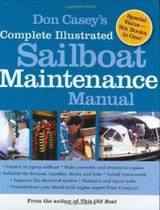 |
| photo by: Joanna Poe |
Last weekend, we attended a lecture at the Cruising Association on ‘Power Systems on Boats’, by Matt Boney.
We’ve attended a lecture on electrics on boats there before, but it’s always good to hear more on this topic again. Confirms that this is definitely something we need to master. Loads of studying ahead for the Can Opener…
Here are the key highlights from the notes I required the Can Opener take down (Hey Furrball, I’m self-motivated! I do not need you camped on my shoulder, waggling my ears like horse reigns to make me write faster…):
Battery Capacity
- Most cruisers do not have enough
- 150amps/day is a small amount
- You probably need a minimum of 300amp hours at 50% of DoD (depth of discharge)
- and batteries only top up to 80% of their capacity
- so you need to actually have more like 420 amp hours to be able to use 300 amp hours/day… and still would have to charge every day
- AND you don’t want to run your battery to 0… only want to run it down to about 25% of battery capacity
- therefore you need even more capacity!
Which battery to use?
- You can mix battery sizes to increase capacity (lifeline tested this) as long as batteries are
- the same age and
- the same make
- With batteries you ‘get what you pay for’… quality costs..
Types of batteries
- Sealed leisure or marine batteries
- are ‘maintenance-free’,
- but can’t be topped up so they won’t last long.
- They are also affected by temperature.
- Gels
- are useful,
- slow discharge
- old technology
- expensive
- hard to find
- AGMs
- are the best (?)
- becoming more popular
- make sure you get the right AGM for the right purpose! (There are many potential uses for these…)
Monitoring your batteries
You should
- charge your batteries to 100% every month to anti-sulfate them – otherwise they will become permanently sulfated
- should estimate when you hit 50% DoD by measuring battery voltage
- must have a panel mounted digital volt meter
- must have a small digital multi-meter
- all batteries must have multi-stage regulators
- test your batteries 2x/year
- use your alarms!
- monitor regularly!
- shore power charger
- solar – recommended 600Watts+ or you won’t be able to replace daily usage
- wind or towing generators – expensive, but easy and convenient
- AC or DC diesel generator – DC is the quieter of the two
- Honda petrol generator – don’t get this one. There are no petrol stations at sea. And you are not really saving a lot on size.



